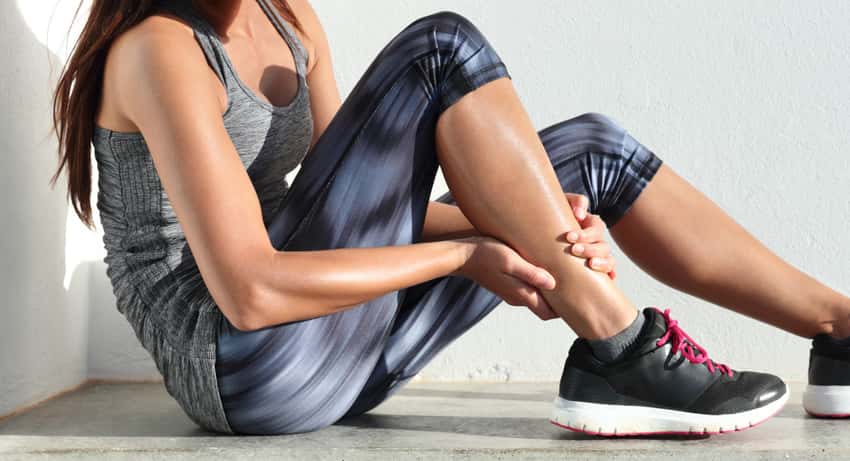Have you ever exerted your muscles through a new form of exercise or increased intensity of the workout, and felt a lingering soreness in the body a day or two later? Why does this happen and what can you do about it? Are sore muscles a good or bad thing? We will answer these questions and also equip you to heal your aching muscles.
Why do our muscles hurt after a workout?
No matter how fit or active you are, muscle stiffness is not uncommon, especially when you push yourself to achieve new heights while working out. You may have decided to walk or cycle longer than you usually do, or you may have tried a new workout routine that exercised a different set of muscles.
Exercise-Induced Muscle Damage (EIMD) or Delayed Onset Muscle Soreness (DOMS) occurs when our muscles suffer microscopic damage. DOMS is sometimes mistaken as a buildup of lactic acid, however, lactic acid leaves our muscles within a few hours. DOMS, on the other hand, can last between 3-5 days. So if you feel a lingering soreness a few days after your workout, you know it is DOMS.
Sore Muscle Recovery
The good news, however, is that you hold the power to help your muscles and don’t necessarily need to seek medical intervention, suffer in pain, or pop in medication.
Below we list five effective ways to recover muscles faster after a workout, which are within your control.
- Massage for Muscle Soreness
One of the most effective ways to alleviate sore muscle stiffness is through massage. In a study conducted in 2005, subjects who lifted weights and received a massage afterward experienced less muscle soreness than the subjects who lifted weights but did not receive a massage.
While it may not be practical or cost-effective to run out for massage therapy every time you experience post-workout muscle stiffness, it is now possible to have a massage gun with you at home. Vibration guns are lower intensity and suitable for minor aches. On the other hand, percussion massagers are more heavy-duty and well suited for athletes and people who undergo intense workouts. They are easy to hold and handle and come with a strong motor that ‘hammers’ sore tissues and muscles deep inside the body.
- Muscle Recovery Drinks and Foods
There is scientific evidence that staying hydrated before, after, and during a workout can not only avoid dehydration and its detrimental after-effects but also lead to better exercise performance. If you prefer sports drinks, these are enhanced with electrolytes that contain minerals like potassium, magnesium, sodium, and calcium, which our body loses during exercise. The latest research suggests that even chocolate milk can be a good drink after an intense workout as it boosts proteins, carbohydrates, and fat in the body. A growing trend is the use of CBD lotion to reduce pain and encourage recovery.
- Sleep for Muscle Recovery
Getting good rest and sleep can play a very vital role in permitting our bodies to heal themselves. Studies on various athletes have led to conclusive evidence that sleep extension and napping can have remarkable beneficial effects on future performance and recovery.
When we sleep, our body has a chance to focus all its energies on healing, improving immunity, and resisting diseases. So if you feel sore after an intense workout, try to get some extra sleep for the following nights or grab a nap in a comfortable place earlier in the day. You are bound to wake up feeling rejuvenated and refreshed.
- Hot or Cold Bath
A warm bath before a workout routine can loosen any stiff muscles, tendons, and joints, leading to less soreness later. However, immediately after a long run or vigorous physical exercise, when inflammation occurs in our muscles, it is recommended to take a cold bath instead to prevent the blood vessels from swelling further.
Soaking in a cool bath, even for fifteen minutes, prevents muscle stiffness and damage. Ice packs applied for short periods of time have a similar effect.
- Anti-Inflammatory Supplements
Exercise-Induced Muscle Damage (EIMD) triggers inflammation and oxidative stress in our muscles. Consuming supplements or foods that are anti-inflammatory and anti-oxidant can counter the cause behind post-workout muscle soreness.
Turmeric is a natural anti-inflammatory deemed GRAS (generally recognized as safe) by the United States Food and Drug Association (FDA). Turmeric or curcumin-containing supplements are considered safe for human ingestion. Alternately, warming up some milk with natural turmeric in it and drinking the mix can also help heal sore muscles.
- Active recovery
Another way to counter post-workout muscle stress is to undertake low intensity and low-impact exercises. This can promote blood flow in the body, thus enabling tissue repair. A simple bike ride, a walk around the block, some yoga stretches or even a few laps of swimming can help with blood circulation. Active recovery is one where you can engage in light exercise that leaves you feeling invigorated instead of fatigued.
Now that you know your post-workout muscle soreness is not unusual, you can attempt to heal it at home with these few simple suggestions. Stretching your body’s limits and attempting new workout routines need not be something to shy away from. Just make sure you listen to your body and offer it the right foods, drinks, and rest to recover.


5